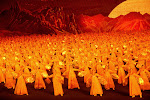Hey guys... happy Friday! Today we did the following things:
1) Defined philosophy
- Remember that "philos" is Greek for "love" ...and "sophos" is Greek for "wisdom."
2) Reviewed SOCRATES
- Remember that Socrates was unusual because he answered people's questions with questions!
3) Heard about Socrates' forced suicide by the Athenian gov't
- Socrates did NOT like democracy because he believed that most people did not vote wisely and did not look at candidates closely enough before making their choice. He also questioned people's beliefs in Greek gods. This angered many in Athens' gov't, so they put him on trial, found him guilty, and sentenced him to death by forcing him to drink poison.
4) Learned about PLATO, another Greek philosopher and student of Soctrates'
- Plato was a student of Socrates' who kept a low profile after Socrates was forced to commit suicide. However, Plato still wanted to help people think more critically and enhance their wisdom. To do this, he wrote a story called The Myth of the Cave. See this story below...
5) We read "The Myth of the Cave" (by Plato)
- Plato writes this short story to get people to realize their "reality" ...meaning that he believed that we walked around in life believing that what we could see, touch, smell, taste, and experience was true reality, but he believed that life was much deeper than this. Please click here to download the Myth of the Cave story and read it. When you are reading it, please try to imagine the scene as if it were a movie :o)
6) We watched a short video on the Myth of the Cave, after reading it.
- Click here for that video! Remember! THIS IS NOT A TRUE STORY!!! THIS IS SYMBOLIC - A METAPHOR!!
7) Finally, we discussed Plato's Myth of the Cave - what does it mean?!?!
- Please think about it! Plato is trying to tell us something with this story. What do you think each part of the story represents???... The cave? The prisoners? The chains? The shadows & echos? The release of the chains? The light outside? The fact that the other prisoners cannot understand the man when he returns? etc... etc... etc...


































